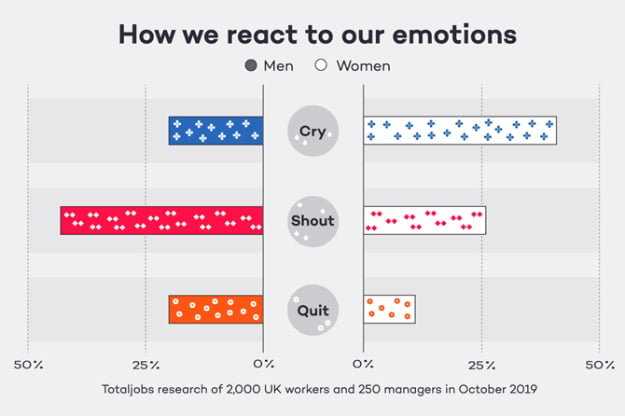Men are more emotional at work than women, study confirms
According to the study, men and women have different triggers to workplace emotions

Men are more emotional at work than women, study confirms
Analysing behavioural patterns of 2,250 workers found that men are twice as likely to display emotional weakness when their “ideas aren’t heard” or because they “are criticised.”

Not just that, according to the survey, they are also three times more likely to get overly emotional if a project goes over budget, misses a deadline or gets cancelled.
The force behind the study, Simpkin, a senior lecturer in leadership and corporate education at Anglia Ruskin University, shed light on how men and women are “socialised to display emotions differently, especially at work.”
According to her research, men and women have different triggers to workplace emotions. Men are 1.6 times more emotional than women about being criticised, 2.4 times more emotional than women because their “ideas weren’t heard" and 2.5 times more emotional than women about “having a fall out," while women are 25% more emotional than men about “stress/frustration.”

The difference in expression and reporting of emotional issues at workplace stems from the social conditioning of men and women. "The notions that women and more ‘nurturing’ and men are more ‘aggressive’ come from (and reinforce) social norms," Simpkin says.
"Clearly, men and women have different emotional responses to workplace issues. But these differences are not hard-wired in our brains," she writes. "‘Display rules’ dictate what, how much and when it is considered socially acceptable to express emotions. Women are more likely than men to report experiencing emotions associated with lack of power, such as fear, sadness, shame and guilt. Men, however, are more likely to report experiencing emotions associated with power, such as anger and pride."

The study also looked at how differently men and women react to their emotions at work. While about 45% of women resort to crying, only about 20% of men cry and majority (45%) shout instead. This reinforces Simpkin's earlier statement about men associating emotions with power rather than fear or sadness.
Nell Scovell, television writer and producer, experienced this first-hand when working on TV shows such as Late Night with David Letterman, The Simpsons and Newhart, when she was usually the only female writer in the room.

“Like a lot of women in the workplace, I was aware of this bias so I made a conscious effort to not give anyone the chance to label me as 'crazy' or 'difficult'," she wrote in a recent essay for Oprah.com. “By being tough and unemotional, I was not acting ‘like a man’. Just the opposite. My male colleagues emoted like crazy. But nobody thought they were ‘hysterical’. When a man storms out of the room, he’s passionate. When a woman storms out, she’s unstable and unprofessional," Scovell went on.
Hopefully, this study can help, even a little, to dispel the dangerous myth that women are incapable of handling pressure at work due to their emotional responses.
Have something to add to the story? Share it in the comments below



















COMMENTS
Comments are moderated and generally will be posted if they are on-topic and not abusive.
For more information, please see our Comments FAQ